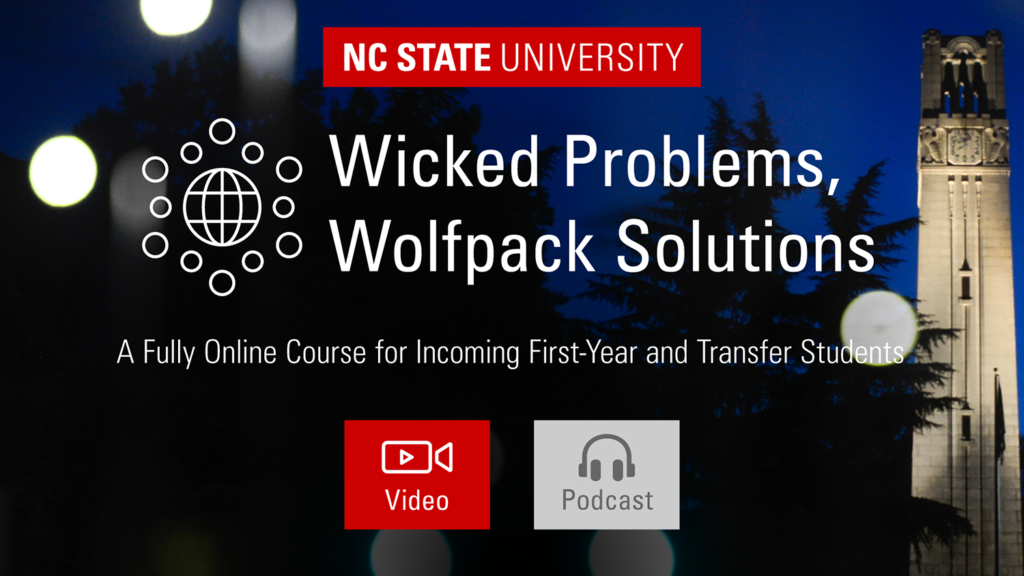Wicked Problems, Wolfpack Solutions 2024/25 Focuses on (Y)Our Health
Two Free Credits Available for Winter Session Dec. 9 – Jan. 5

Wicked Problems, Wolfpack Solutions (WPWS) is a unique multidisciplinary experience created for all incoming first-year and transfer students and their families. Each year, this course focuses on a current “wicked problem,” defined as a highly complex global issue that can only be addressed through collaborative, multidisciplinary efforts.
Designed to encourage students new to NC State to explore various academic disciplines, the no-cost two-credit course connects students to our Wolfpack community while they apply a Think and Do approach to solving global challenges. The course also introduces students to the academic technologies they will use at NC State.
The course counts toward the Interdisciplinary Perspectives GEP requirement.
The course for winter 2024, (Y)Our Health, explores challenges and potential solutions to physical and mental health, related social justice issues, and individual and collective agency to affect change locally, regionally and globally.
Each instructional unit will engage students through a real-life situation and then offer wide-ranging multidisciplinary perspectives on that unit’s topic. Common threads through each unit include: physical health, mental health, social justice, personal and collective agency, and academic, scholarly and community solutions to global problems.
WPWS was recognized with the 2024 Gertrude Cox Award for Excellence in Teaching and Learning with Technology.
Associate Teaching Professors Melissa Ramirez and Jason Flores will lead the instruction for the course. They have curated each unit to pique student interest using a relatable, real-life problem that students address in the course using the tools and resources available from a range of multidisciplinary perspectives.
After the five-week online course, students will have a better understanding of the complexity of these health-related wicked problems. Participants will also gain understanding around the intersectionality of issues that cannot be solved by any one person, discipline, group or government.

WPWS was first offered during the summer of 2020 to provide incoming first-year students a chance to connect, virtually, with the campus community in the midst of an isolating global pandemic. Appropriately, the first iteration of the course explored the history, biology and societal impacts of pandemics. In this first-of-its-kind course offering, students met faculty, peers and NC State alumni from a variety of disciplines.
Videos from previous courses are available to anyone, at NC State and beyond. Motivated high school students can get a jump start on their college experience and interested community members can also explore the resources NC State offers.
The Student Experience
This course is offered fully online through Moodle, NC State’s learning platform. New first-year incoming and transfer students are automatically added to the course and can access it as soon as it opens. If they complete the course, they earn two free credits. If they do not participate or do not complete the course after starting, there is no penalty and it will not appear on their transcript.
“This was a great way to be exposed to many different areas of study. It gave me a way to see how NC State is responding to global issues.”
In each unit, students watch presentation videos or listen to podcasts on a topic, complete self-check activities to reflect on what they learned, and share their thoughts with peers. Each unit also includes a reflection in which students consider course content as well as their academic and career interests, values, and possible pathways at NC State.
“Not only was it a great opportunity to get ahead in my education at NC State (free class!) but it also was very relevant and interesting to have this essential foundational knowledge on issues that affect all of us, regardless of what area one studies or works in,” said a student who recently completed the course.
WPWS emphasizes NC State’s mandate to Think and Do: Explore different ways of thinking, different perspectives and strategies for solving big problems.
Related Information
- Categories:


